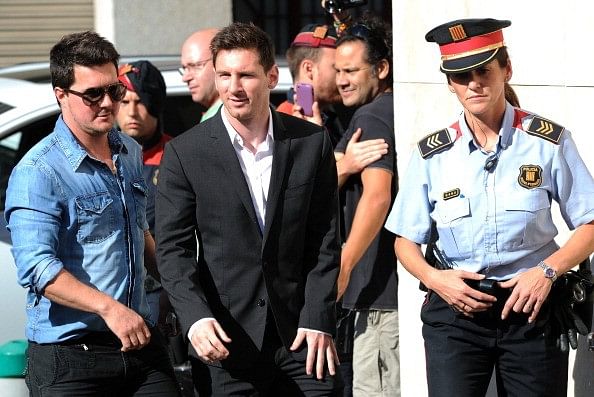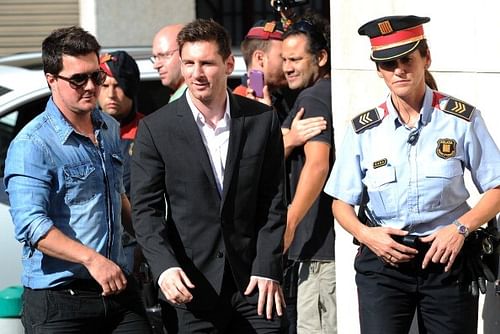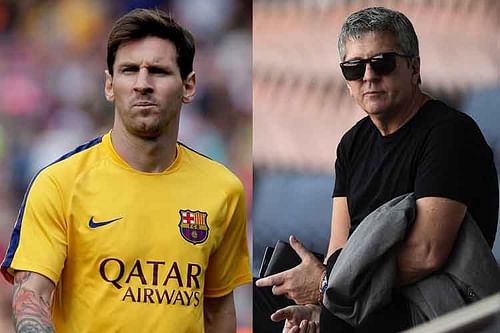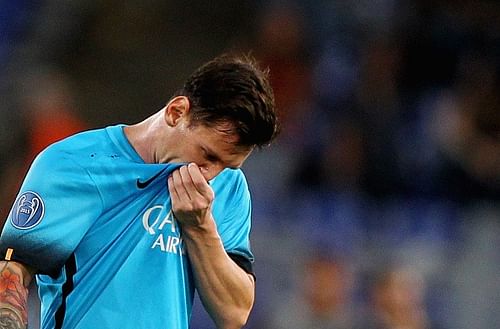
Explaining the tax fraud lawsuit against Lionel Messi and whether he will really go to prison

Lionel Messi’s woes this season continues to mount this season. After being sidelined for two months due to a knee injury, the Barcelona legend has been met with the news that a Spanish attorney has rejected a request to clear the Barcelona player of wrongdoing, and decided to charge him and his father with tax fraud. This comes just days after it was reported that Spain had dropped criminal tax charges against the footballer. Now it appears that the trial is on again.
The prosecution
Messi and his father are being accused of defrauding Spain's tax office of €4.1 million ($4.6 million) in unpaid taxes from 2007 to 2009. The stance of the state attorney is in stark contrast to that of Spain’s public prosecutor, who had said the Albiceleste captain should not have to answer the charges as his father oversaw his finances.
According to reports, “acting in opposition” to the Fiscalía (the equivalent of the district attorney or prosecutor), a higher state authority (the State Attorney, which defends the interest of Spain’s Treasury) wants the case to proceed, as they believe, contrary to the prosecution’s determination, that Messi acted de forma consciente y voluntaria (consciously and voluntarily).
The prosecutor had determined that as Messi was not ‘fully aware of his father's unlawful activities’, he should not have been charged. But the state attorney's office argues that the footballer knew enough to also be named in the case, stating that even if he had not set up his business contracts himself, Messi “couldn’t have ignored” the fact that a huge chunk of his income was being generated via offshore companies.
Twitter user Diana Kristinne attemts to explain the seemingly confusing series of events:
Messi’s tax fraud case history
The ruling is just the latest chapter in a long and complicated case that began in 2013. A complaint signed by prosecutor Raquel Amado alleged that the two had initiated a scheme using a series of offshore shell companies in tax havens like Belize to shield royalties and other licensing income.

The investigations that followed, focused mostly on Messi’s tax returns that were filed between 2007 and 2009, and looked into the claim that the duo had defrauded the state of about €4 million (about $4.5 million) by avoiding paying Spanish taxes. The allegations claim that an elaborate ploy was devised to hide Messi’s considerable revenue from the Argentine’s various lucrative contracts with major companies like Pepsi, Procter & Gamble and Adidas, and funnel them to tax havens using companies in Uruguay, Belize, Switzerland and the United Kingdom.
Shortly after the charges were made public, the pair denied any involvement.
”I never take care of that stuff myself and neither does my father. We have our lawyers and our wealth managers to take care of that and we trust them and they will sort this out.
“The truth is that I don’t have a clue about all this and that is why we have people taking care of it.” – Messi
Nevertheless, they took steps to clear alleged the tax debt, with his father making a “corrective payment” of €5 million ($6.57 million U.S.) in August 2013 to cover unpaid taxes, plus interest. That did not, however, discourage prosecutors from continuing to pursue charges with the Spanish court confirming in early June 2015 that Messi and his father, Jorge Horacio Messi, would remain under investigation on tax fraud charges and would be facing trial, and a ruling in October 2014 reiterated the same.
Both of the accused appeared in court in the Catalan town of Gava in September 2013. Since then there have been various rulings in the case, and various legal steps have either stalled or advanced the proceedings at various intervals.
A dramatic turnaround then ensued later when prosecutors dropped the charges against the Argentine, who has been a Spanish citizen since 2005, and called for called for an 18-month prison sentence for Messi's father only, along with a fine of €2 million ($2.2 million). Their basis was that Messi had not actively participated in the alleged fraud, and hence was not culpable.
The latest twist in the tale sees the Spanish attorney disregard the prosecutor’s instruction following a report from the state legal services which represent Spain’s national tax agency. They called for Messi and his father to face charges. The court claims that it was not necessary for Messi ''to have full knowledge of all accounting or corporate transactions or the exact amount of the fraud'' for him to have had a clear idea of an intention to defraud.
Possible punishment
A date has still not been set for the hearing, but the verdict will determine the fate of both Messi Jr and Sr. While Messi’s father has always maintained his son plays no part in the management of his money, with Messi even once telling authorities that he would “sign anything with his eyes closed” if his father told him to do it. Whether or not he had a punishable role in the events leading up to the charges, though, will now be decided by a judge with Messi called to give evidence in a court case.

The attorney's office have called for both defendants to face a 7-and-a-half month prison sentence for each individual charge. Facing three charges, it could mean an overall sentence of 22 months and 15 days for Messi and his father, along with a fine for the amount defrauded, payment of all legal proceedings and the loss of any possible tax benefits for a year-and-a-half.
Prosecutors had called for an 18-month prison sentence for Messi's father only, along with a fine of €2 million ($2.2 million).
However, in all likelihood, both are unlikely to end up in jail, as sentences of less than two years are normally suspended for first time offences in Spain. Furthermore, the €5million to the tax authorities as a 'corrective payment' to cover the money owed from 2007 to 2009 back in 2013, will mean that a maximum sentence is highly unlikely regardless.
But the law does work in mysterious ways, and one would have to wait for the verdict to see if the four-time Ballon d’Or winner, will be out of the reckoning and behind bars the next time the award ceremony comes around.